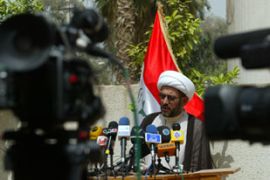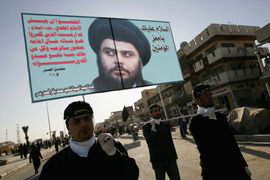Iraqis flee fighting in Sadr City
Iraqi and US forces increase pressure on al-Sadr to disband his al-Mahdi Army.

Published On 8 Apr 2008
Later, another roadside bomb hit a US patrol near Sadr City, injuring a number of soldiers, police said.
Clerics silent
Al-Sadr has been under pressure to disband his fighters or be barred from politics.
Aides said on Monday that al-Sadr would dismantle the group only if ordered by Shia religious leaders.
So far, they have remained silent.
The Sadrists plan to consult Grand Ayatollah Ali al-Sistani, the Shia religious leader, and other clerics.
If they “recommend” the al-Mahdi Army be disbanded “he [al-Sadr] will obey”, Hassan al-Zarqani, another aide, was quoted by the Associated Press as saying.
It is unclear whether the Iranian born al-Sistani would publically take a position on whether the al-Mahdi Army should be disbanded or not.
Shia clerics intervened twice in 2004 to resolve uprisings led by al-Sadr against the US-led forces.
Power-broker
If his movement competes in elections later this year, al-Sadr stands to make significant gains, cementing his image as a political power.
The Sadrists currently hold 30 seats in the 275-member parliament, but that would not be enough to allow al-Sadr to block legislation banning his movement from politics.
His supporters say that banning them from politics would be unconstitutional. They have proposed talks to resolve the standoff.
Salah al-Obeidi, an Sadrist spokesman, told journalists in the city of Najaf: “We are calling for dialogue as a way to solve problems among Iraqi groups.
“Al-Sadr’s office affirms that the door is open to reach an understanding regarding these problems.”
Al-Sadr has called for a mass rally in Baghdad on Wednesday, the fifth anniversary of the US capture of the city, to demand an end to the US military presence.
Subsequently, the authorities have imposed restrictions on men between the age of 12 and 35 entering Baghdad between 6am (03:00 GMT) on Tuesday to 6am on April 10.
Ultimatum
Nuri al-Maliki, Iraq’s Shia prime minister, issued the ultimatum to al-Sadr on Monday, saying in an interview with CNN that unless the fighters were disbanded, al-Sadr’s followers would not be allowed to participate in politics or run in provincial elections.
 |
|
If ordered by Shia religious leaders, al-Sadr |
Al-Maliki said: “A decision was taken … that they no longer have a right to participate in the political process or take part in the upcoming elections unless they end the Mahdi Army.”
Al-Maliki personally oversaw a crackdown on the al-Mahdi Army in the southern city of Basra at the end of March in which scores of people died.
The fighting quickly spread to Baghdad and across the country, prompting the prime minister to order a freeze on operations against the fighters.
Al-Maliki has admitted that Iraqi forces are “far away” from gaining control of “the militias”.
Casualties
At least six people are reported to have died in a roadside bomb attack on a bus in Bala Druz in Diyala province on Tuesday.
Also in Diyala, armed men killed Sheikh Sami al-Ubaidi, an awakening group leader, and his two sons.
Police said at least 14 civilians were killed in clashes on Monday, nine of them in Sadr City.
Three American soldiers were also killed on Monday in separate attacks in the capital – one by small-arms fire and two others by a rocket-propelled grenade, the US said. The military did not specify where the men had been killed.
In Washington, General David Petraeus, the highest US commander in Iraq, was due to report to congress on the progress of the US “surge” in Iraq later on Tuesday.
He is expected to call for patience and announce that he will stop plans for troop withdrawals in July.
Source: Al Jazeera, News Agencies